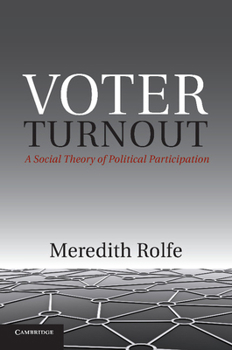Voter Turnout: A Social Theory of Political Participation
(Part of the Political Economy of Institutions and Decisions Series)
Select Format
Select Condition 
Book Overview
This book develops and empirically tests a social theory of political participation. It overturns prior understandings of why some people (such as college-degree holders, churchgoers and citizens in national rather than local elections) vote more often than others. The book shows that the standard demographic variables are not proxies for variation in the individual costs and benefits of participation, but for systematic variation in the patterns...
Format:Paperback
Language:English
ISBN:1107617987
ISBN13:9781107617988
Release Date:August 2013
Publisher:Cambridge University Press
Length:248 Pages
Weight:0.33 lbs.
Dimensions:0.6" x 6.0" x 9.0"
Customer Reviews
0 rating





